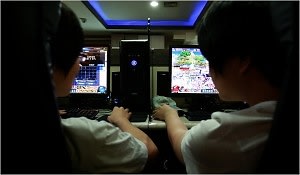 If you're reading this post on your iPad while you check email on your smartphone and peruse the latest porn offerings on your laptop, congratulations: you are getting dumber. Now follow this link to read the Times article explaining why on your Kindle, or get the gist below.
If you're reading this post on your iPad while you check email on your smartphone and peruse the latest porn offerings on your laptop, congratulations: you are getting dumber. Now follow this link to read the Times article explaining why on your Kindle, or get the gist below.
There are many good things about having vast repositories of information accessible to us through the click of a mouse or touchpad. But there are dangers as well. Given the relative youth of today's media- and digital roadkill-saturated culture, the list of threats will likely grow as research into the biological and mental effects of being plugged in 24/7 expands.
Today's Times gives an unsettling preview of what's to come. Matt Richtel is the man behind the sudden surge in Klonopin prescriptions on the Google campus. Here's what he says:
"Scientists say juggling e-mail, phone calls and other incoming information can change how people think and behave. They say our ability to focus is being undermined by bursts of information...While many people say multitasking makes them more productive, research shows otherwise. Heavy multitaskers actually have more trouble focusing and shutting out irrelevant information, scientists say, and they experience more stress."
The article goes on to further debunk the myth of the effective multitasker and put into words that linking feeling we've all come to know too well:
“The media is changing me,” [Stanford researcher Eyal Ophir] says. “I hear this internal ping that says: check e-mail and voice mail.”
Results range from the benign to the very, very serious.
One subject of the article named Kord Campbell neglected to read a life-changing email--a big company wanted to buy his internet start-up--since it was buried in a deluge of eVites, useless newsletters and G-Chat messages. Hilariously, the Times allows readers to use an interactive timesuck portal to scan a panoramic shot of Campbell's crowded workspace. It comes complete with pop-up descriptions of every site on his six available screens. It's overwhelming and stressed me out and distracted me from the efficient writing of this post.
More severe problems result from people combining tasks like texting and driving or, in one chilling recent case from South Korea, a mother and father playing video games for twelve hours as their baby starved to death in their apartment.
The article should give people pause about the destructive potential of internet addiction, particularly as Internet Week kicks off today in New York. Instead of tweeting about that event, go for a nice long walk outside. It's a gorgeous day. Leave your phone at home. And maybe even read the Times piece in its print form.
Photo 1 via Chip Simons/Business Week, 2 via Jin-Hee/International Herald Tribune



.jpg)
.jpg)



.jpg)
.jpg)
.jpg)




